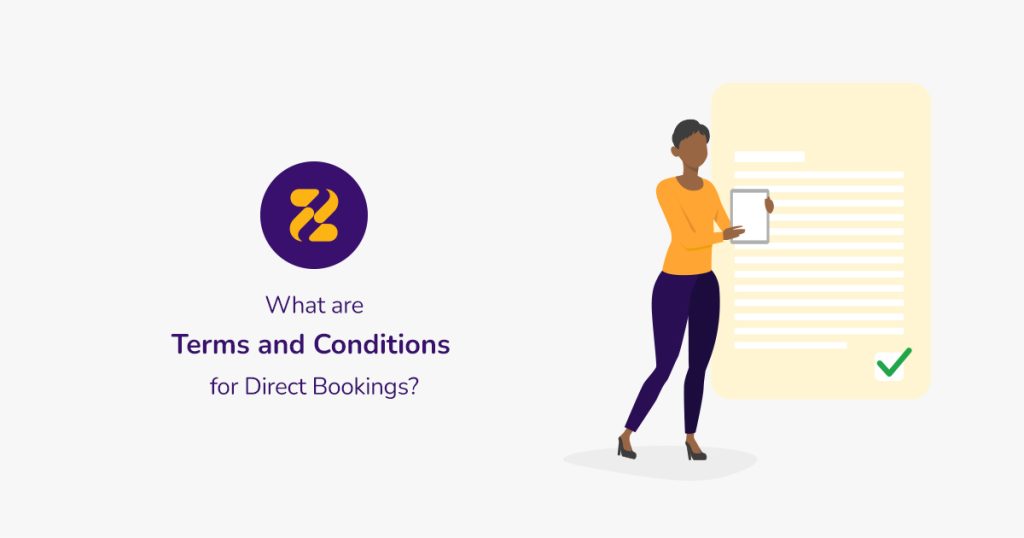Table of Contents
What Are Terms and Conditions for Direct Bookings?
Terms and Conditions for direct bookings, a rental agreement, or contract between host and guest, are different names for the same thing. They refer to a document where a host outlines the conditions under which the guest can make use of their accommodation. Guests need to agree to these conditions before gaining access to the property.
A rental agreement usually covers aspects such as what the host is offering. It also serves to limit the host’s liability in case something goes wrong. For example, this could involve an item being stolen from a guest’s car. Moreover, the contract usually sets out house rules, informing the guest of how they are expected to behave while they are using a host’s property.
In this blog, we’ve highlighted why having such an agreement is crucial for your vacation rental business. Plus, we’re offering Free Sample Terms and Conditions for Direct Bookings that you can use right away!
Why Do You Need an Agreement in Place with Your Guest?
Besides informing guests about your expected behaviour, there are other reasons for having them sign your Terms and Conditions. Firstly, it helps limit your liability in case of mishaps. Moreover, should a guest cause damage, they will have agreed in advance to cover it.
Of course, you should keep a security deposit for minor damages. But what if they throw a party that ends up costing you thousands upon thousands in damages? For this reason, besides getting your rental agreement signed, it is also important to collect your guest’s ID.
Doesn’t Airbnb Vet My Guests Already?
Airbnb does not fully vet your guests. Airbnb uses an outsourced service that checks guests’ IDs if this is something you have marked as a requirement. However, this check only looks for any known reports against the person. Some national and international databases are checked. It verifies the validity of the ID itself to ensure there have been no reports of it being lost or stolen.

However, there is no guarantee that an ID that passes a check means that the guest is safe to host. Moreover, the accuracy of the checks depends on the information available in the database of the issuing country. Finally, should the system not be able to detect a match, a person will take a look at the scan of the ID and decide whether it appears genuine or not. Thus, it is of paramount importance that you have your own guest vetting procedures in place.
How to Automate Guest Vetting for Direct Bookings
Every time a booking comes in, whether directly through your website, by phone, email, or via a platform such as Airbnb, you should vet your guests. You need to ensure that the guest does not pose a risk to your property and your business.
To make sure everything goes smoothly, it’s a good idea to have them sign your terms and conditions and collect their ID (at least that of the lead guest). Ideally, this should be done soon after payment has been received. By doing so, they will be obligated to sign your terms, having already paid. Furthermore, it will provide you with enough time to address a cancellation if you are not comfortable accepting the guest. Avoid waiting until arrival, as it could result in an unpleasant confrontation.
Tools for Automating Guest Vetting in Direct Bookings
There are various tools out there that allow you to get a document digitally signed. Make sure the tool you use is legally binding. At Zeevou, we have developed an E-signature Rental Agreement feature. This allows you to get your terms and conditions digitally signed by guests without having to pay extra for other tools. Once the guest has signed the terms and conditions, we will display this in Zeevou. And a copy of the agreement envelope will be available for download.

However, it is not sufficient to just have your contract signed and ID collected. You need to be careful and ensure that your eyes are open for any other warning signs of potential trouble. Although the following are not always signs of a troublesome guest, you should be extra cautious if you notice any of the following:
- Last minute bookings
- Bookings by someone with a local address
- Single night bookings on a weekend
- Guests who refuse to sign your terms and conditions
- Guests who refuse to pay a security deposit
- Guests who claim that your 3-D Secure payment links are not working
- Young guests
- Guests who are unable to answer satisfyingly when questioned
Ultimately, if your gut feeling says that there is something wrong with the guest, there probably is. Trust your judgement, and don’t take unnecessary risks. By having a strong direct booking website and distributing through a powerful channel manager to multiple booking sites, you should be able to resell your nights again.
Sample Terms and Conditions for Direct Bookings – FREE Download
We have compiled sample terms & conditions that you can use for taking direct bookings. You can also use them for bookings that you take on other platforms. Please be aware that these have not undergone legal review and are intended solely to provide guidance on what you might include in your terms. Zeevou accepts no liability if these terms and conditions do not protect you in case of issues. You should check the validity of the agreement and the need to include any other terms relevant to your country with a lawyer. To download the Sample Terms and Conditions, Click Here.






